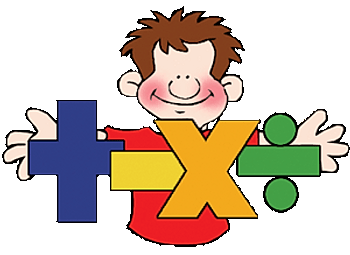When answering maths questions, especially worded problems, it is important to know how to work through it. Below are some hints and tips on how to tackle maths questions and worded problems.
Problem Solving Strategies
*Remember that not all of these are suitable for every maths question. Choose the best strategy for the problem you are working on.
- Look for the important words in the question. Write them down or underline them. Decide on what the question is asking you to do .e.g. multiplication? fractions? subtraction?
- Look for a pattern. Can you see somehting happening over and over again? Will this help you solve the problem?
- Have a go! Try an answer. Does the answer make sense?
- Use a table or a chart. Will something like this help?
- Use a drawing. Can you draw something about the problem? Will this help you to find the answer?
- Work backwards. Can you start at the ned of the question to help work it out? Will your answer work?
- Try an easier problem. Can you change the numbers in the question to make it simpler? Will this make finding the answer easier?
- Make a model. Can you use paper or blocks to help you find the answer? Can you use people to help you find the answer?
- Think logically. Can you tell somehting about the answer straight away? Can you get rid of answers that are not correct?
Mental Maths Strategies
We have been be practising these strategies in class throughout the year. Use the strategies that feel best to you because not every one will ‘feel’ natural for you.
Mathematical Vocabulary – Word Problem Words
Increased by – The class had 15 pupils and was increased by 10 children. How many children are there in the class now?
more – Julie has 21 Beanie Babies in her collection – her sister Emma has 10 more. How many does Emma have?
combined/put together – Jake and Joel combined their pocket money of £5.50 each to buy the new Xbox game. How much money did they have together?
total (smaller numbers) – There were 8 Roses, 12 Carnations, and 2 Daisies. How many flowers did they have in total?
sum – Alexis earned £10 washing cars and Sarah earned £15. What was the sum of their earnings?
added to – Ellie saved £3.50 last week. Added to savings of £2 this week, how much does she now have?
altogether (smaller numbers) – Jake has 13 sweets and Jarratt has 22! How many sweets do they have altogether?
in all (smaller numbers) – Auntie Anne gives Jade 12 carrots from her allotment and her mum brings back a bag of 8 from Asda. How many carrots does she have in all?
additional – Ben has 105 Harry Potter collector cards. If he had ten additional baseball cards, how many would he have in all?
decreased by – The population of 1000 whales decreased by 400 in the last year. How many are left?
minus – She had £10, minus the amount she spent on the £3 drink. How much did she have in all?
drops/dropped – The temperature was 4° and just dropped by another 3°! What is the temperature now?
difference between /difference of – Gemma’s mum gives her £3.50 pocket money for hovering and polishing through the house. James gets £5 for doing the same thing. What is the difference between their pocket money?
More than – Jacob has 16 marbles – that’s 12 more than William. How many marbles does William have?
Less than – Sarah has 20 sweets and her sister Suzie has 5 less than her. How many sweets does Suzie have?
Fewer – Jenny baked six fewer cookies than Elizabeth, who made 12. How many cookies does Jenny have?
How many more – Kate has 20 Daises and Emily has 31. How many more Daises does Emily have than Kate?
How much more – Billy has spent the last year saving £150 – he desperately wants a laptop that costs £300. How much more does he need to buy it?
Left – Mrs. Bee bakes 30 beautiful chocolate-chip muffins for the adults in school. 18 people grab one at break. How many are left?
remain/remains – There are 15 people on the bus and 3 people get off. How many people remain on the bus?
Words ending in “er” (higher, longer, faster, heav-ier, larger, shorter, slower, further, etc.) – Jack can run 100m in 25 seconds but Andrew can do it in 14! How much faster is Andrew’s 100m race than Jack’s?
Take away – Jamie has 12 biscuits. If his mum takes away 10, how many does he have?
twice – Elijah Wood, the actor in ‘lord of the Rings,’ played a hobbit that was 120cm tall but in real life the actor is twice as tall! How tall is he really?
times – Caroline’s school bag weighs 2g but her brother, Ollie, likes to take lots of books to school – his bag weighs 5 times as much! What does his weigh?
multiplied by – There used to be 100 children in school. The number of pupils has multiplied by three in the last few years! How many children are there now?
product of – What is the product of five and four?
in all (bigger numbers) – At the cinema (screen 8) there were 10 rows of seats and 20 chairs in each row. How many seats were there in all?
total (bigger numbers) – In the garden there are five rows with five plants in each row. How many plants are there total?
each (answer getting bigger!) – Each pair of socks cost £1.00. How much will six pairs cost?
doubled, tripled, quadrupled etc. – There were 3,000 rabbits in the UK. The population (total number of rabbits) tripled in two years. How many are there now?
each (answer getting smaller!) – Pens cost £1 each – how many pens can I buy with £6?
equal / equally – I bought a dozen (12) eggs from the market this morning and split them equally between two boxes. How many eggs went in each box?
separate – Hannah and I make 50 friendship bracelets – we decide to separate them evenly and sell them. How many bracelets do we each have?
share – Bailey brings in 60 sweets for his birthday and decides to share them out in class. There are 20 children in his class – how many sweets do they each receive?
split – On a class trip, there is a class of 24 children and they are split into 6 groups. How many children are in each group?
group/groups – At swimming, the class of 32 children is split evenly into two groups. How many pupils are in each group?
fractions (half, quarter, fifth, sixth, tenth etc.) – Kieran has £20. He spends half of this money on cat food – how much does he have left for other things?




























.svg/940px-Operators_(plus_minus_times_divide).svg.png)
























































































































